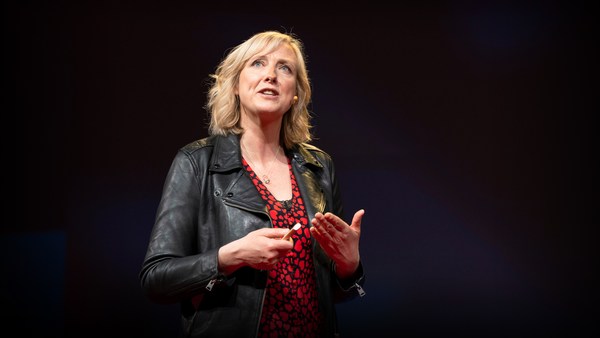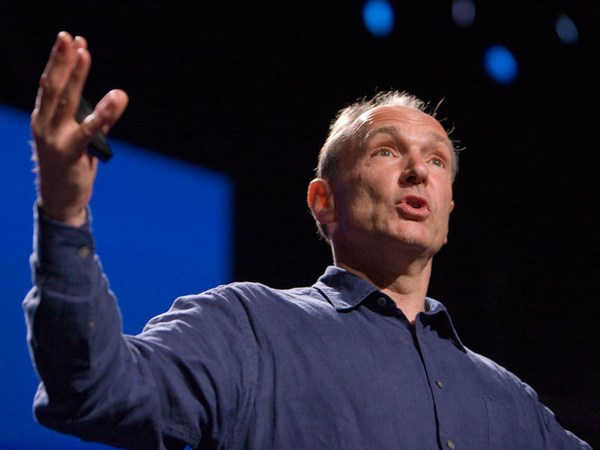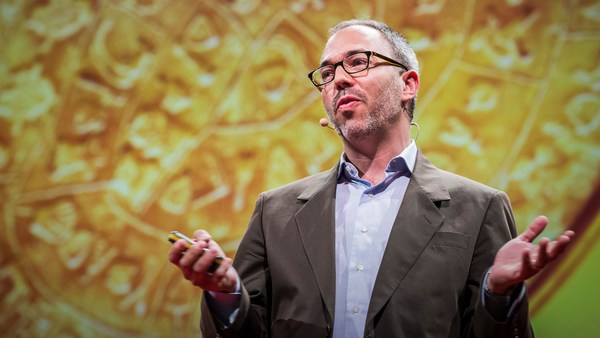I grew up in the late '70s in rural China during the final years of my country's pursuit of absolute equality at the expense of liberty. At that time, everybody had a job, but everyone was struggling. In the early '80s, my dad was an electrician, and my mom worked two shifts in the local hospital. But still, we didn't have enough food, and our living conditions were dismal. We were undoubtedly equal -- we were equally poor. The state owned everything. We owned nothing. The story I'm going to share with you is about my struggles of overcoming adversity with my resilience, grit and sheer determination. No, I'm just kidding, I'm not going to do that to you.
(Laughter)
Instead, I'm going to tell you, what I'm going to talk about today is about a new form of collective poverty that many of us don't recognize and that urgently needs to be understood.
I'm sure you've noticed that in the past 20 years, that asset has emerged. It's been generating wealth at a breakneck pace. As a tool, it has brought businesses deep customer insights, operational efficiency and enormous top-line growth. But for some, it has also provided a device to manipulate a democratic election or perform surveillance for profit or political purposes. What is this miracle asset? You've guessed it: it's data.
Seven out of the top 10 most valuable companies in the world are tech companies that either directly generate profit from data or are empowered by data from the core. Multiple surveys show that the vast majority of business decision makers regard data as an essential asset for success. We have all experienced how data is shifting this major paradigm shift for our personal, economic and political lives. Whoever owns the data owns the future.
But who's producing the data? I assume everyone in this room has a smartphone, several social media accounts and has done a Google search or two in the past week. We are all producing data. Yes.
It is estimated that by 2030, 10 years from now, there will be about 125 billion connected devices in the world. That's an average of about 15 devices per person. We are already producing data every day. We'll be producing exponentially more. Google, Facebook and Tencent's combined revenue in 2018 was 236 billion US dollars. Now, how many of you have received payment from them for the data you generate for them? None, right? Data has immense value but is centrally controlled and owned. You are all walking raw materials for those large data companies, but none of you are paid.
Not only that, you're not even considered as part of this equation for income. So once again, we are undoubtedly equal: we're equally poor. Somebody else owns everything, and we own nothing. Sounds familiar, doesn't it?
So what should we do? There might be some clues in how my life turned out after that difficult start. Things began to look up for my family in the '80s. The system evolved, and people began to be allowed to own a piece of what we created. "People diving into the ocean," or "xia hai," the Chinese term, described those who left state-owned enterprise jobs and started their own businesses. Private ownership of a business became personal ownership of cars, properties, food, clothes and things. The economic machine started rolling, and people's lives began to improve. For the first time, to get rich was glorious. So in the '90s, when I went to study in Chengdu in west China, many young individuals like myself were well-positioned to take advantage of the new system. After I graduated from my university, I cofounded my first business and moved to Shenzhen, the brand-new special economic zone that used to be a fishing village. Twenty years later, Shenzhen has become a global innovation powerhouse.
Private ownership was a form of liberty we didn't have before. It created unprecedented opportunities for our generations, motivating us to work and study incredibly hard. The result was that more than 850 million people rose out of poverty. According to the World Bank, China's extreme poverty rate in 1981, when I was a little kid, was 88 percent. By 2015, 0.7 percent. I am a product of that success, and I am very happy to share that today, I have my own AI business, and I lead a very worldly and dynamic life, a path that was unimaginable when I was a kid in west China.
Of course, this prosperity came with a trade-off, with equality, the environment and freedom. And obviously I'm not here to argue that China has it all figured out. We haven't. Nor that data is fully comparable to physical assets. It is not. But my life experience allowed me to see what's hiding in plain sight. Currently, the public discourse is so focused on the regulatory and privacy issue when it comes to data ownership. But I want to ask: What if we look at data ownership in completely different ways? What if data ownership is, in fact, a personal, individual and economic issue? What if, in the new digital economy, we are allowed to own a piece of what we create and give people the liberty of private data ownership?
The legal concept of ownership is when you can possess, use, gift, pass on, destroy or trade it or sell your asset at a price accepted by you. What if we give that same definition to individuals' data, so individuals can use or destroy our data or we trade it at our chosen price?
Now, I know some of you might say, "I would never, ever trade my data for any amount of money." But that, let me remind you, is exactly what you're doing now, except you're giving your data away for free. Plus, privacy is a very personal and nuanced issue. You might have the privilege to prioritize your privacy over money, but for millions of small business owners in China who can't get bank loans easily, using their data to gain rapid loan approval from AI-powered lenders can answer their more pressing needs. What's private to you is different from what's private to others. What's private to you now is different from what was private when you were in college. Or, at least, I hope so.
(Laughter)
We are always, although often subconsciously, making such trade-offs based on our diverse personal beliefs and life priorities. That is why data ownership would be incomplete without a pricing power.
By assigning pricing power to individuals, we gain a tool to reflect our personal and nuanced preferences. So, for example, you could choose to donate your data for free if a contribution to a particular medical research is very meaningful for you. Or, if we had the tools to set our behavior data at a price of, say, 100,000 US dollars, I doubt any political group would be able to target or manipulate your vote. You control. You decide.
Now, I know this sounds probably implausible, but trends are already pointing to a growing and very powerful individual data ownership movement. First, start-ups are already creating tools to allow us to take back some control. A new browser called Brave empowers users with "Brave Shields" -- they literally call it that -- by aggressively blocking data-grabbing ads and trackers, and avoid leaking data like other browsers. In return, users can take back some bargaining and pricing power. When users opt in to accept ads, Brave rewards users with "basic attention tokens" that can redeem content behind paywalls from publishers. And I've been using Brave for a few months. It has already blocked more than 200,000 ads and trackers and saved hours of my time. Now, I know some of you interact with your browser more than with your partners, so --
(Laughter) you should at least find one that doesn't waste your time and is not creepy.
(Laughter)
Do you think Google is indispensable? Think again. A search engine is indispensable. Google just has the monopoly -- for now. A search engine called DuckDuckGo doesn't store your personal information or follow you around with ads or track your personal browsing history. Instead, it gives all users the same search results instead of based on your personal browsing records.
In London, a company called digi.me offers an app you can download on your smartphone that helps to import and consolidate your data generated by you from your Fitbit, Spotify, social media accounts ... And you can choose where to store your data, and digi.me will help you to make your data work for you by providing insights that used to be exclusively accessible by large data companies.
In DC, a new initiative called UBDI, U-B-D-I, Universal Basic Data Income, helps people to make money by sharing anonymous insights through their data for companies that can use them for market research. And whenever a company purchases a study, users get paid in cash and UBDI points to track their contribution, potentially as much as 1,000 US dollars per year per their estimation. UBDI could be a very feasible path for universal basic income in the AI economy.
Further, individual awareness of privacy and data ownership is growing fast as we all become aware of this monster we have unleashed in our pocket. I'm a mother of two preteen girls, and trust me, the single biggest source of stress and anxiety as a parent, for me, is my children's relationship with technology. This is a three-page agreement my husband and I make them sign before they receive their first [mobile phone].
(Laughter)
We want to help them to become digital citizens, but only if we can make them become smart and responsible ones. I help them to understand what kind of data should never be shared. So if you Google me, in fact -- actually, sorry -- if you DuckDuckGo me, you will find maybe a lot about me and my work, but you may find no information about my daughters. When they grow up, if they want to put themselves out there, it's their choice, not mine, despite that I insist they're the most beautiful, smartest and most extraordinary kids in the world, of course. And I know many people are having similar conversations and making similar decisions, which gives me hope that a truly smart data-rich future will be here soon.
But I want to highlight the Clause 6 of this agreement. It says, "I will never, ever search for any information online if I would be embarrassed if seen by Grandma Dawnie."
(Laughter)
Try it. It's really effective.
(Laughter)
Throughout history, there has always been a trade-off between liberty and equality in the pursuit of prosperity. The world has constantly been going through the circle of wealth accumulation to wealth redistribution. As the tension between the haves and have-nots is breaking so many countries, it is in everyone's interest, including the large data companies, to prevent this new form of inequality.
Of course, individual data ownership is not the perfect nor the complete answer to this profoundly complex question of what makes a good digital society. But according to McKinsey, AI will add 13 trillion US dollars of economic output in the next 10 years. Data generated by individuals will no doubt contribute to this enormous growth. Shouldn't we at least consider an economic model that empowers the people? And if private ownership helped to lift more than 850 million people out of poverty, it is our duty and we owe it to future generations to create a more inclusive AI economy that will empower the people in addition to businesses.
Thank you.
(Applause)





